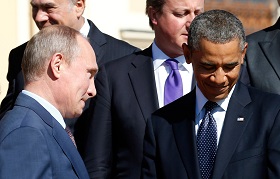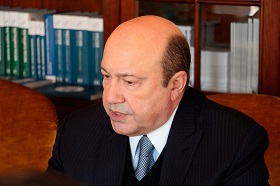The international security conference GLOBSEC 2015 in Bratislava that took place between June 19-21 is considered by many to be a kind of "Central European Munich." In attendance are presidents, prime ministers and foreign ministers from across Central and Eastern Europe.
Also taking part are high-ranking officials from the U.S. State Department and the European Commission, as well as the heads of large defense companies, top international affairs experts and journalists.
Russia-West relations are the leitmotif of the forum. As expected, criticism of Russia is not in short supply. However, it is no longer 2014, when the political changes in the region were nigh on catastrophic.
The first impression from the 2015 meeting is that the acute phase is over. The state of relations is dramatically serious but stable. The question is: Where will this stability lead? Down the path of compromise, or towards new regional and global upheavals?
Is the acute phase of the crisis really behind us?
In the post-Soviet quarter-century, we have developed a fear of crises. And not without reason. But a crisis is just a transition from one state to another, ultimately leading to a smoother trajectory — or greater turmoil. Either outcome can be a means to a higher end. The final result is everything.
Today the intensity of relations between Russia and the West has abated somewhat. The conflict in Ukraine is now one of arguing over positions, and outwardly the situation in Russia itself looks more stable than it did six months ago. The acute phase of the crisis seems to be over.
However, the fundamental issues encircling Russia's relations with the West have not been resolved. Neither have the complexities of the country's general economic development. Slowly but surely, the antagonisms are accumulating irreversibly. And that means that new problems are simply a matter of time.
A total loss of trust now characterizes Russia-West relations
A qualitatively new element has appeared in relations between Russia and the West — a total loss of mutual trust. The problems of trust have been a mantra of politicians and experts over the entire post-Soviet period. Now the matter has been wrapped up conclusively.
In the absence of trust, there are no problems with trust itself. The problem is finding it. Strategically, neither the West nor Russia considers each other as reliable partners.
"Danger," "challenge" and "threat" are the standard buzzwords in the political lexicon on both sides. This atmosphere has permeated business projects and everyday contacts. The rift that began as political is becoming economic and even socio-economic.
The new Euro-Atlantic security arrangement
Along with the political relationship, the whole architecture of Euro-Atlantic security is crumbling too. It is no laughing matter and concerns everyone. What on earth is happening?
It began first of all with the gradual erosion of the basic treaties on nuclear arms reduction, specifically the Intermediate and Shorter-Range Nuclear Forces (INF) and Strategic Arms Reduction (START) treaties.
The matter is no longer confined to the standard political rhetoric. The INF Treaty was cited in the Ukraine Freedom Support Act, signed into law last year in the United States. START appeared in a recent amendment to the law on U.S. defense outlays, linking the financing of obligations on reducing offensive arms to Russia's respect for Ukrainian sovereignty.
Nothing tragic has come of it so far — both treaties remain in force. But for the first time in three decades, an inherently local crisis is having a direct impact on the global security architecture.
Even before the Ukraine crisis, Russia and the United States were divided on a host of local issues. But they were all discussed separately from the basic treaties on nuclear weapons. That informal procedure has been violated.
As a result, we are sleepwalking towards the dismantlement of the system of Euro-Atlantic security laid down by the Soviet Union and the United States. One can argue long and hard about who threw the first stone. That's not what's important.
In the medium term we will see a new nuclear arms race, in which regard the issues of conventional weapons, the militarization of space and the growing competition in cyberspace are interrelated.
The erosion of Euro-Atlantic security and its consequences
The European region is rapidly becoming less secure. The Ukraine conflict is only the visible part of the process; the long-term trend has far more destructive potential. We are heading towards a situation in which nuclear conflict is being pushed to the fore, acquiring clear contours in the process.
No one wants it, of course. But the safety cables holding us above the precipice are becoming weaker. And there is insufficient desire and trust to pilot a new system of security.
The implications of a new arms race for the United States
A new arms race would have economic repercussions. For both sides. After the acute financial crisis of 2008-2009, neither Russia nor the West is in the best shape for costly military-political adventurism.
The problems of the West are more visible — bad debt in the private sector (the U.S. subprime mortgage market was the most obvious example) quickly spread to the entire global financial system. But it didn't stop there. It also significantly undermined the public finances of many countries around the globe.
If further proof is needed, a quick glance at the IMF's own data will provide it. Average GDP growth in the developed world hovered around the zero mark in 2008, before plummeting almost 3.5 percent in 2009. Today's figures still lag way behind pre-crisis growth levels. For instance, the euro zone, Russia's main trading partner, last year grew by less than 1 percent.
Since 2007 the debt burden of developed countries has risen from an average of around 72 percent of GDP to nearly 105 percent. In the same period the debt-to-GDP ratio among the G7 countries has increased from 81 percent to 118 percent of GDP, and in the euro zone from 65 percent to 94 percent of GDP.
The problems of developed countries lie on the surface. No sooner has a glimmer of economic hope pierced the darkness than state intervention is again called for. And not to improve the economic data. The money is needed for defense, and the costs could well hurt some already weakened economies.
Moreover, the crisis has significantly reduced the resources available, which are a far cry from what they were seven years ago. And even back then, by no means all countries could afford large-scale expenditure of such kind.
The implications for Europe
This is very visibly the case in Europe, where the economic lie of the land is extremely varied. Whereas Germany's national debt is only 73 percent of GDP (an increase of 10 percentage points from 2007), Britain's is 90 percent, France's 95 percent, Spain's 98 percent, Italy's 132 percent and Greece's 177 percent.
In the case of Greece, the government's thoughts are a long way from military spending, as can seen from the news, and it is a fair assumption that other quite large countries are also trying to tighten their belts.
Russia's development model is used up
Russia seemed to have successfully overcome the first phase of the crisis. Until recently the situation was not too bad.
The recession of 2009 could not be avoided, of course, but debt rose only very slightly, and the country's reserves remained intact and even grew nicely in 2010-2012. In 2015, however, the economy is not suffering from a mere recession. In addition to a sharp drop in commodity prices, many internal processes have stopped supporting growth, and business does not see new prospects or sources of development.
Starting 2012, per capita consumption (the key indicator for the bulk of Russian businesses) was fueled mostly by credit. Its potential has now been exhausted. As a result, total net outflow of capital since the beginning of 2008 significantly exceeds $600 billion, while domestic demand has nosedived.
The details are complex, but the general outline simple: Russia's development model is used up and needs to be replaced. Without a fresh approach to the economic challenges at both the public and private level, growth may not return for a long time to come.
What are the options available?
The bottom line is that instead of recovering their losses from the crisis and focusing on development, while ensuring a safe and secure environment, which could help pull investment away from other regions (Southeast Asia, for example), Russia and the West are creating the conditions for a further deterioration in their own and neighboring economies.
As a result, Europe's appeal is waning. It will continue to lose out to more successful economic competitors. Suffice it to look at how GDP per capita has grown in China, the engine of the Asian economy, since 2007 to understand that even without political confrontation the countries of Europe are facing development problems.
According to the IMF, in 2007 Russia's GDP per capita was almost 3.5 times larger than China's. By the end of 2015 they will be equal, while in the same period the gap with Germany (the euro zone's current leader) will be reduced threefold, and with Greece more than fourfold.
What's more, Russia could well end up being the weakest link in the race. Its economy is far less diversified than its main opponents and far less focused on efficiency, and given the current state of the commodity markets, external demand cannot be relied upon to balance the books.
The question arises as to what should be done. The answer is clear: Both Russia and the West (especially the EU) need to concentrate on economic development instead of wasting limited resources on muscle flexing.
Engaged in direct confrontation, as the two sides are, neither can easily remain in isolation, hence the response must be joint. If not, our competitive positions will be further eroded. And that is in the best case.
In the worst, we will add the rising risk of full-scale armed conflict to our list of woes.
This article was originally published at Russia Direct.







